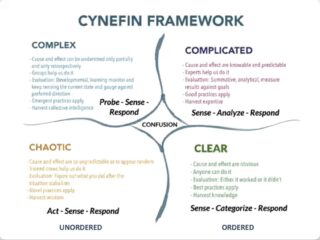Matthew Mezey's activity
In group: Liberating Structures in healthcare
-
Matthew Mezey posted an update in the group Liberating Structures in healthcare 3 months, 3 weeks ago
Like Maria, I wanted to thank Petra and Afra for a rewarding and challenging session around understanding complexity etc by using the Agreement-Certainty Matrix – and all the attendees too.
If you joined the Zoom please fill in this quick feedback survey – to help us improve our Liberating Structures meet-ups: https://survey.eu.qualtrics.com/jfe/form/SV_bxAYi7KtedD6dvg
They offered a very resonant scenario around stepping into a new leadership role and needing to bring the team together around a common vision. We aimed to categorise the challenges that were part of that.
Petra did brilliantly to step in to take over Afra’s part of the facilitation when she was hit by connection issues.
The issues around simple/complicated challenges vs complex challenges feel crucial for the NHS – as if we use the methods appropriate for predictable challenges for complex challenges we will never reach positive outcomes for those big challenges.
In some ways it felt like we were only scratching the surface of these deep issues – and could have gone on into much further discussion, had there been time.
We did wonder, during the Zoom, whether the sorting into simple, complicated, complex and chaotic was actually made easier by the using the certainty and agreement axes, or not. Did they perhaps just complicate the picture of what we were doing?
A similar model of these 4 types is Dave Snowden’s Cynefin model – SEE ATTACHED IMAGE – which doesn’t make use of such axes. Would that be easier to use for categorisation, I don’t know? Here’s how one might use Cynefin for a workshop: https://www.newhaircut.com/blog/lightning-lab-cynefin-framework
Our standard response to most problems is to focus on analysis, applying best practices etc but these models have found that for complex problems such an approach doesn’t help reach a solution. Instead experiments/safe probes must be set up, and analysed. See this article from the improvement org AQUA: https://aqua.nhs.uk/wp-content/uploads/2023/07/qsir-safe-to-fail-experiments.pdf
Moving up to a more national picture of what’s going on, it does seem that there is finally a major change quietly emerging (from the bottom up) in public services, away from simple linear approaches, monitoring and targets towards a more learning-focused one suitable for complex challenges.
This new Demos report on ‘Liberated Public Services’ (ie complexity-based, relational services) gives a good overview (though rather underplaying that this work has in fact been going on for years, using the Liberated Services label): https://demos.co.uk/research/liberated-public-services-a-new-vision-for-citizens-professionals-and-policy-makers/
Q Community members – like Mandy Westcott, Matt Bell, Sam Allen, Diana Hekerem etc are actually leading/supporting this Human Learning Systems/Liberated Services work in Scotland, Wales, Plymouth, NENC etc! So, really at the cutting edge of more empowered, relational, ‘bespoke by default’ approaches – which can save millions by slashing the ‘failure demand’ endemic in our clunky bureaucratic systems. And make work much more fulfilling too!
Former Wigan Council CEO Donna Hall calls this emerging movement a ‘rebel alliance’ 😉
Also, Q is planning a future Zoom where students of/users of systems/complexity approaches can meet and share experiences – look out for details soon.
.